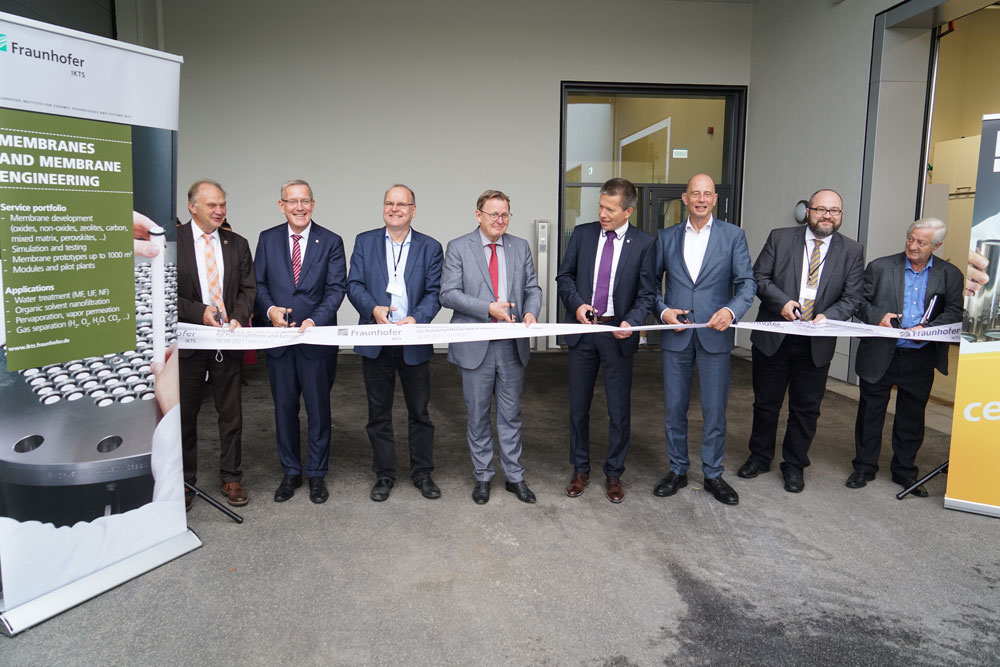New facility for stationary energy storage and membranes in Hermsdorf officially opened
The “Pilot Center for Powder Synthesis and Extrusion” was officially inaugurated after a two-year construction period and adds approximately 600 m² of usable space to the facilities of the Fraunhofer Institute for Ceramic Technologies and Systems IKTS in Hermsdorf. Research topics in the new building are sta-tionary energy storage and ceramic membranes for material separation. The construction was funded by the federal government and the Free State of Thuringia with 6.4 million euros.

Thuringia's Prime Minister Bodo Ramelow, Minister of Economics Wolfgang Tiefensee, Andreas Meuer, Member of the Executive Board of the Fraunhofer-Gesellschaft, as well as District Administrator Andreas Heller and Hermsdorf's mayor Benny Hofmann celebrated the inauguration of the new building together with guests from industry, politics and science as well as Fraunhofer IKTS researchers. On nearly 600 m², state-of-the-art laboratories, pilot plants as well as offices and storage areas have been built in the last two years. In addition, the exterior of the adjacent technical building was extensively renovated, so that IKTS at the Hermsdorf site now has an outwardly representative facilities, which are also optimally equipped on the inside for the complex research topics.
Stationary energy storage and digital process monitoring
One of the core topics being worked on at the pilot center is the development of the ceramic sodium battery. As an environmentally friendly energy storage device for stationary applications, the battery can make an important contribution to achieving climate targets by reliably storing renewable energy. The machines and equipment in the pilot center are technologically equipped to enable the production of pilot-scale components. Among other things, machines for shaping are fitted with the latest sensor technology, providing unique electronic monitoring of the details of the manufacturing process. In addition, digital elements of continuous quality control are being explored. This process control is crucial for the industrially relevant scaling of the technologies.
Voices:
Bodo Ramelow, Minister President of the Free State of Thuringia
“The Fraunhofer Institute for Ceramic Technologies and Systems IKTS, with its locations in Thuringia and Saxony, has been able to build on its long tradition and research achievements in advanced ceramics. The employees here continuously deliver top performance, not least in the increasingly important business field of energy storage technologies. The federal government and the Free State of Thuringia have always reliably supported this impressive success with investments and are doing so again with the tailor-made extension building for the demanding research work. With this investment, Thuringia is helping to write industrial history and advance the mass production of battery components and membrane tubes.”
Wolfgang Tiefensee, Thuringia’s Minister for Economy, Research and Digital Society
“Eco-friendly and at the same time powerful batteries are of enormous and steadily growing importance for climate protection and the energy turnaround. Thuringia identified this need early on and has made numerous investments in this area in recent years. The Fraunhofer Institute for Ceramic Technologies and Systems IKTS, with its Thuringian sites in Hermsdorf and at the Erfurter Kreuz, is making a decisive contribution to advancing these technologies. It develops solutions close to industry, from the idea to technical implementation. The new building with its research area is another milestone to expand the competence in ceramic membranes and stationary storage and thus in the field of energy-efficient and resource-saving battery and energy storage technology and to develop Thuringia into a leading battery location.”
Prof. Ingolf Voigt, deputy institute director and site manager Hermsdorf at Fraunhofer IKTS
“In the pilot center, we can work on research fields that make an important contribution to the energy transition. The completion of the building is also part of the dynamic development of the IKTS site in Hermsdorf. The space freed up by the new building will be used for the planned intensification of activities in the field of transparent ceramics. The extensive research topics in the field of water have already been combined in the rented water center on the institute's premises since November 2020. In addition, the establishment of an experimental field for recycling technologies is planned for the future. Supplemented by networking with the companies at the Hermsdorf industrial site, with whom we cooperate in the TRIDELTA CAMPUS HERMSDORF initiative, these are steps towards establishing the region as a leading center for high-performance ceramics in Europe.”